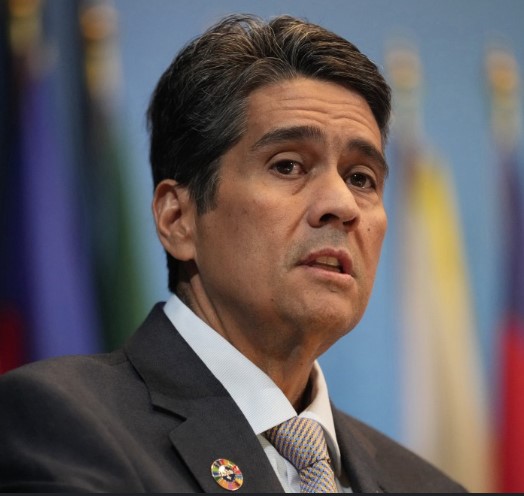Palau, a small island nation located in the Pacific Ocean, has been struggling with repeated violations of its maritime borders by Chinese vessels. Recently, President Surangel Whipps Jr., who was re-elected, raised concerns about Chinese research ships entering Palau’s waters without permission.
Palau Faces Unwelcome Intrusion by Chinese Vessels
These vessels have been detected multiple times in Palau’s exclusive economic zone, which is a maritime area where Palau has special rights for economic activities such as fishing and resource exploration.
Whipps emphasized that the presence of these ships is not only unwelcome but also illegal, given that Palau has the right to control who enters its waters. Despite the repeated complaints made by the Palauan government, China continues to send ships into these waters. This situation has been a source of tension, as Palau seeks to maintain its sovereignty and protect its maritime territory from foreign encroachment.
China’s Claim on Palau’s Underwater Mountains
In addition to sending vessels into Palau’s waters, China has also been engaged in what appears to be an effort to undermine Palau’s territorial claims. Earlier this year, Chinese officials renamed two underwater mountains located in Palau’s exclusive economic zone. These seamounts, which are part of Palau’s natural resources, were given Chinese names despite being under Palau’s jurisdiction.
This move has raised questions among Palau’s leadership. Why would China feel the need to rename features within Palau’s waters? It is a provocative action that only adds to the growing tensions between the two nations. The renaming of the seamounts is seen by Palau as an attempt to assert China’s control over areas that rightfully belong to the island nation.
Palau’s Strong Ties with the United States and Taiwan
A small nation with just around 20,000 people, this island country has long maintained strong diplomatic ties with the United States and Taiwan. It is one of the few countries that recognizes Taiwan’s sovereignty, a stance that has strained relations with China. Over the years, China has convinced several Pacific nations to switch their diplomatic recognition from Taiwan to China. However, this nation has upheld its position, much to the displeasure of Beijing.
This decision has not come without consequences. The country’s economy, heavily reliant on tourism—especially from Chinese visitors—suffered a severe blow when China banned its citizens from traveling there in 2017, in retaliation for refusing to sever ties with Taiwan. The absence of Chinese tourists led to a significant economic downturn, as the country was once a popular destination for those seeking to explore its pristine beaches and world-renowned dive spots.
Despite these challenges, the government has been actively seeking ways to diversify the economy. Efforts are focused on expanding sectors like fishing and financial services to reduce dependence on tourism. Moreover, the country has been working closely with the United States, Japan, and Taiwan to attract new investments and economic partnerships to fill the gap left by the decline in Chinese tourism.
Palau’s Strategic Importance and the U.S. Military Presence
Located in the northern Pacific, the island nation is strategically important not just for itself, but also for the United States. In 1994, the nation and the U.S. signed a “Compact of Free Association,” allowing the U.S. to use its territory for military purposes in exchange for financial support and defense commitments. As part of this agreement, the United States established a military presence, including the construction of a radar station that serves as an early warning system for potential threats, particularly from China. This radar system plays a key role in monitoring military activities in the Taiwan Strait and surrounding areas.
To support the U.S. Navy’s presence, efforts are underway to expand the commercial port to accommodate more visits from U.S. warships. This strengthening of military ties has raised concerns in Beijing, as China has become more assertive in its actions in the region, particularly in the South China Sea.
The defense cooperation with the U.S. is a significant part of the nation’s strategy. The United States provides hundreds of millions of dollars in financial aid annually and assumes responsibility for its national defense. This arrangement is crucial for the island’s security, especially as China continues to expand its influence in the Pacific region.
Palau’s Struggles with Economic Diversification and Sovereignty
The ongoing struggle with Chinese encroachment on maritime borders is just one aspect of the island nation’s broader challenges. The country has made it clear that it values its friendship with Taiwan, despite the economic consequences of China’s retaliation. By maintaining diplomatic relations with Taiwan, the nation aims to preserve its sovereignty and independence in the face of external pressures.
Once heavily reliant on tourism from Chinese visitors, the economy has had to adapt in response to these difficulties. Efforts are being made to grow sectors such as fishing and financial services to reduce dependence on tourism, which has been significantly impacted by China’s actions. Despite these challenges, the island nation remains steadfast in its commitment to its diplomatic alliances and in protecting its sovereignty amidst China’s increasing aggression in the region.


